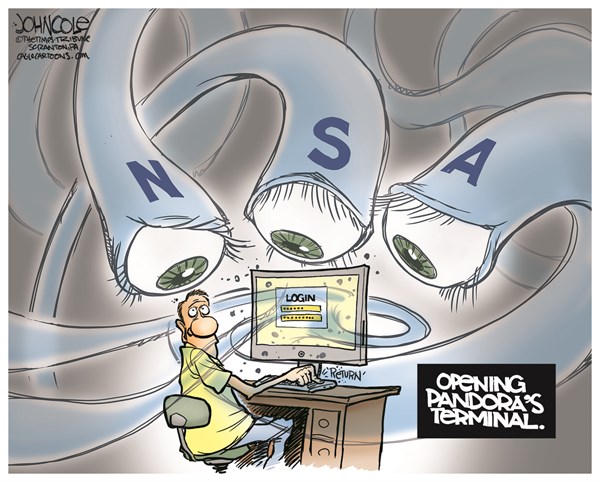QUOTE OF THE DAY
WSJ: The Full-Time Scandal of Part-Time America
There has been a distinctive odor of hype lately about the national jobs report for June. Most people will have the impression that the 288,000 jobs created last month were full-time. Not so.
The Obama administration and much of the media trumpeting the figure overlooked that the government numbers didn’t distinguish between new part-time and full-time jobs. Full-time jobs last month plunged by 523,000, according to the Bureau of Labor Statistics. What has increased are part-time jobs. They soared by about 800,000 to more than 28 million. Just think of all those Americans working part time, no doubt glad to have the work but also contending with lower pay, diminished benefits and little job security.
On July 2 President Obama boasted that the jobs report “showed the sixth straight month of job growth” in the private economy. “Make no mistake,” he said. “We are headed in the right direction.” What he failed to mention is that only 47.7% of adults in the U.S. are working full time. Yes, the percentage of unemployed has fallen, but that’s worth barely a Bronx cheer. It reflects the bleak fact that 2.4 million Americans have become discouraged and dropped out of the workforce. You might as well say that the unemployment rate would be zero if everyone quit looking for work.
Chicago Tribune: Lawmakers intervene in teacher licensing
State lawmakers have intervened repeatedly in Illinois’ teacher licensing process, going to bat in some cases for candidates who did not meet state requirements and applicants with criminal pasts as well as for relatives, donors and constituents, a Tribune investigation revealed.
The newspaper found nearly 100 cases in the past five years in which lawmakers got involved in the system that determines who can work as classroom aides, teachers and school administrators or hold other jobs.
The cases are outlined in hundreds of pages of documents and email exchanges obtained by the newspaper, dating to 2009, when House Speaker Michael Madigan’s office helped push a young woman’s licensing case to the head of the line.
Crain’s: The hidden costs of Emanuel’s minimum-wage hike
The mayor of a city with one of the highest unemployment rates in the nation wouldn’t seem like a guy who would embrace a proposal that only would make the problem worse.
Yet that is precisely what Mayor Rahm Emanuel is doing by endorsing a 58 percent increase in the minimum wage in just the city of Chicago, to $13 an hour, from the statewide floor of $8.25.
Jet-setting from coast to coast, perhaps Mr. Emanuel is confusing Chicago with other cities that recently hiked their minimum wages, such as Seattle (where the jobless rate was 4.9 percent in 2013), San Francisco (5.7 percent) and San Jose, California (7.6 percent). In his own city, the unemployment rate was 10.5 percent, seventh-highest in the country among major cities, according to the most recent city-only statistics from the U.S. Census Bureau.
In May, unemployment for the Chicago area was 7.2 percent, also seventh-highest among major metropolitan areas, but that includes the suburbs, where unemployment is lower—and likely would go even lower thanks to Mr. Emanuel.
Chicago Sun Times: West Side liquor-license flap a study in clout
At last month’s grand opening of a shopping center anchored by a Pete’s Fresh Market grocery, Mayor Rahm Emanuel hailed the supermarket as an oasis in what had been a “food desert” on the West Side.
Besides food, Pete’s also sells liquor — even though the new store is next door to a church, the Greater Bethlehem Healing Temple, and state law bans liquor sales within 100 feet of churches or schools.
So how can Pete’s be selling beer, wine and spirits?
NWI: Cost of corruption weighs heavily on state budgets
Corrupt government officials sometimes pay a hefty personal price for their misdeeds. Just ask former Illinois Gov. Rod Blagojevich, whose 2008 attempt to sell President Barack Obama’s U.S. Senate seat and shake down a children’s hospital earned him 14 years in federal prison.
Now new research by an Indiana University professor has found residents of the most corrupt states literally pay a steep price for crimes committed by their elected officials due to artificially inflated state spending that’s typically tied to public corruption.
John Mikesell, IU professor of public and environmental affairs, and Cheol Liu, assistant professor of public policy at City University of Hong Kong, determined that the 10 most corrupt U.S. states — which includes Illinois, but not Indiana — would have spent 5.2 percent less between 1997-2008 if they had only an average amount of corruption.
Daily Herald: Who pays your doc? Info will be available online
When many of us have a medical appointment we’re concerned about our finances: how much will we owe out-of-pocket? What’s our co-pay? But next time, you may also want to ask your doctors about their financial situation.
That’s because nearly 95 percent of U.S. physicians accept gifts, meals, payments, travel and other services from companies that make the drugs and medical products they prescribe, according to the New England Journal of Medicine. This has been a common practice for decades and studies show it affects doctors’ prescribing decisions. But for the first time, patients will soon be able draw back the curtain.
Starting in September the federal government will make available an exhaustive online database of payments to U.S. physicians and hospitals, under a section of the health care overhaul passed in 2010. The measure, known as the Sunshine Act, requires most makers of drugs and medical supplies to report all payments, gifts and other services worth $10 or more that they provide to health professionals.
Real Clear Policy: West Side liquor-license flap a study in clout
The White House recently put out a 40-page report arguing that the 24 states that have not expanded Medicaid coverage under the Affordable Care Act (ACA or “Obamacare”) are hurting their poor and themselves. It’s an easy case to make, but it’s incomplete and misleading. The further truth is that Medicaid also threatens to crowd out spending for many traditional state and local functions: schools, police, roads, libraries and more.
Indeed, this has been happening for decades. From 1989 to 2013, the share of states’ general funds devoted to Medicaid has risen from 9 percent to 19 percent, reports the National Association of State Budget Officers. Under present law, the squeeze will worsen. The White House report doesn’t discuss this. The paradox is that a progressive program also has unprogressive consequences.
CARTOON OF THE DAY

